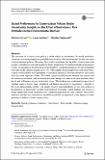Files in this item
Stated preferences for conservation policies under uncertainty : insights on the effect of individuals’ risk attitudes in the environmental domain
Item metadata
| dc.contributor.author | Faccioli, Michela | |
| dc.contributor.author | Kuhfuss, Laure | |
| dc.contributor.author | Czajkowski, Mikołaj | |
| dc.date.accessioned | 2018-09-18T10:30:59Z | |
| dc.date.available | 2018-09-18T10:30:59Z | |
| dc.date.issued | 2019-06 | |
| dc.identifier | 255838967 | |
| dc.identifier | d1a026f4-70a0-42ca-9350-39eec066ce5f | |
| dc.identifier | 85053379232 | |
| dc.identifier | 000468095100010 | |
| dc.identifier.citation | Faccioli , M , Kuhfuss , L & Czajkowski , M 2019 , ' Stated preferences for conservation policies under uncertainty : insights on the effect of individuals’ risk attitudes in the environmental domain ' , Environmental and Resource Economics , vol. 73 , no. 2 , pp. 627-659 . https://doi.org/10.1007/s10640-018-0276-2 | en |
| dc.identifier.issn | 1573-1502 | |
| dc.identifier.uri | https://hdl.handle.net/10023/16044 | |
| dc.description | The preparation of this manuscript was mostly funded through the Scottish Government Rural Affairs and the Environment Portfolio Strategic Research Programme 2016–2021 (WP 1.4. “Sustainable Management of Natural Assets”). MC gratefully acknowledges the support of the National Science Centre of Poland (Sonata 10, 2015/19/D/HS4/01972). | en |
| dc.description.abstract | The outcome of a conservation policy is often subject to uncertainty. In stated preference valuation, it is increasingly recognised that uncertainty affects preferences for the outcomes of environmental policies. However, there is also agreement that the effect of uncertainty and people’s attitudes towards risk need to be better understood. To shed more light on the impact of risk, we designed a discrete choice experiment to compare preferences for environmental outcomes under climate change across two split samples. Each sample was confronted with a scenario where results were presented as certain or uncertain, but were otherwise associated with the same expected values. We found significant differences between the certain and the uncertain treatment, with uncertain outcomes being associated with more extreme utility levels and willingness to pay, in absolute terms. This finding was confirmed irrespective of whether gains or losses were considered and despite sensitivity to uncertainty—specific to the socio-demographic profile. Our results suggest that individuals are not risk neutral in the presence of uncertainty around environmental outcomes. These findings are crucial to better understand stated preferences for conservation policies in risky contexts. Our results reinforce the idea that uncertainty should be explicitly incorporated in the design of stated preference studies to better inform policy. | |
| dc.format.extent | 33 | |
| dc.format.extent | 1466738 | |
| dc.language.iso | eng | |
| dc.relation.ispartof | Environmental and Resource Economics | en |
| dc.subject | Stated preference valuation | en |
| dc.subject | Uncertainty | en |
| dc.subject | Risk attitude | en |
| dc.subject | Climate change | en |
| dc.subject | Conservation | en |
| dc.subject | G Geography (General) | en |
| dc.subject | H Social Sciences (General) | en |
| dc.subject | NDAS | en |
| dc.subject | SDG 13 - Climate Action | en |
| dc.subject.lcc | G1 | en |
| dc.subject.lcc | H1 | en |
| dc.title | Stated preferences for conservation policies under uncertainty : insights on the effect of individuals’ risk attitudes in the environmental domain | en |
| dc.type | Journal article | en |
| dc.contributor.institution | University of St Andrews. School of Geography & Sustainable Development | en |
| dc.identifier.doi | 10.1007/s10640-018-0276-2 | |
| dc.description.status | Peer reviewed | en |
| dc.identifier.url | https://link.springer.com/article/10.1007%2Fs10640-018-0276-2#SupplementaryMaterial | en |
This item appears in the following Collection(s)
Items in the St Andrews Research Repository are protected by copyright, with all rights reserved, unless otherwise indicated.

